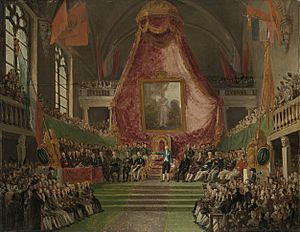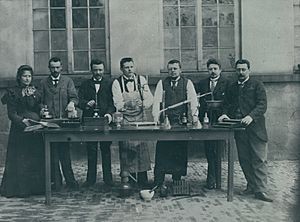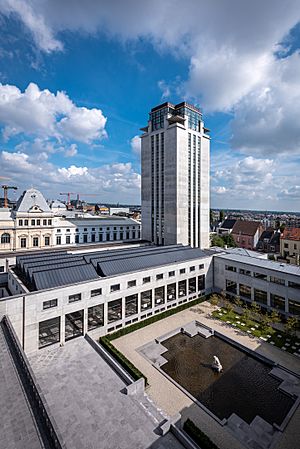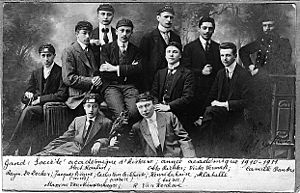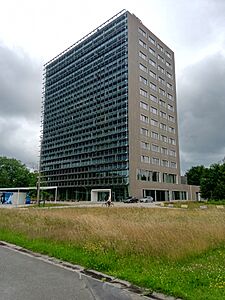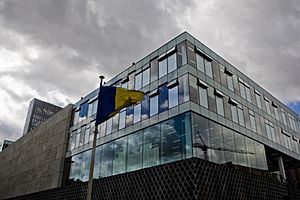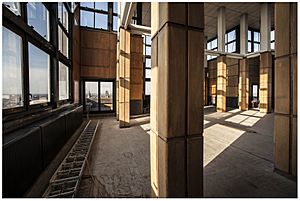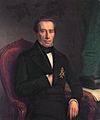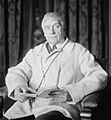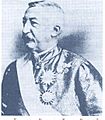Ghent University facts for kids
|
Universiteit Gent
|
|
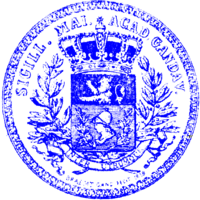
Seal of Ghent University
|
|
| Latin: Universitas Gandavensis | |
|
Former names
|
State University of Ghent |
|---|---|
| Motto | Sapere Aude (Latin) |
|
Motto in English
|
Dare to Think/Durf Denken |
| Type | Public |
| Established | 1817 |
| Rector | Rik Van de Walle |
|
Administrative staff
|
9,000 |
| Students | +50,000 |
| Location | , |
| Campus | University town |
| Colours | UGent blue & white |
| Affiliations | CESAER EUA The Guild SGroup ENLIGHT 3I University Network 3C Partnership |
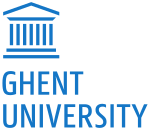 |
|
Ghent University (Dutch: Universiteit Gent), often called UGent, is a big public research university. It is located in the city of Ghent, in the East Flanders area of Belgium.
UGent is the second largest university in Belgium. It has over 50,000 students and 9,000 staff members. The university also has a large library, the Ghent University Library, which includes the famous Boekentoren (Book Tower). It also runs the Ghent University Hospital, one of Belgium's biggest hospitals. Besides its main campus, UGent has other locations in Flanders and a campus in Songdo, South Korea. It also works with many other universities around the world.
The university was started in 1817 by King William I of the Netherlands. This was before Belgium became its own country. At that time, the region was part of the United Kingdom of the Netherlands. King William I also started two other universities in the same year: University of Liège and State University of Leuven.
After Belgium became independent in 1830, the Belgian government took over Ghent University. In 1930, UGent became the first university in Belgium to teach in Dutch. Before that, French was the main language, and even earlier, Latin was used. In 1991, the university gained more independence. It changed its name from State University of Ghent (Dutch: Rijksuniversiteit Gent) to its current name, Universiteit Gent.
Contents
A Look Back: Ghent University's Story
How it Started in the 1800s
Ghent was a very important city in Europe during the Middle Ages. The university officially opened on October 9, 1817. JC van Rotterdam was its first leader, called a rector. King William I started universities in Ghent, Liege, and Leuven to help education grow in the southern parts of the Netherlands. These areas later became Belgium.
When it first opened, the university had four main study areas: Humanities (like literature), Law, Medicine, and Science. All classes were taught in Latin. In its first year, there were 190 students and 16 professors.
After the Belgian Revolution in 1830, fewer students attended. The university even closed its humanities and science departments for a short time. But they reopened five years later, in 1835. At this time, French became the main language for teaching, replacing Latin.
Ghent University also played a part in the development of modern chemistry. A famous chemist named Friedrich August Kekulé figured out the structure of benzene while he was there. Another important chemist, Adolf von Baeyer, who was a student of Kekulé, also made big discoveries in chemistry.
In 1882, Sidonie Verhelst became the first female student at Ghent University. She studied science and pharmacy.
Big Changes in the 1900s
In 1903, a politician named Lodewijk De Raet successfully pushed for classes to be taught in Dutch. The first Dutch courses started in 1906.
During World War I, Ghent University closed for a while. This was because the staff and students refused to teach or study while Belgium was occupied by Germany. The German leaders tried to use this to their advantage. They opened the first Dutch-speaking university in Ghent in 1916, called the Vlaamsche Hoogeschool. People sometimes called it the Von Bissing University. But after the war, it closed, and Ghent University went back to teaching only in French.
In 1923, a government minister named Pierre Nolf proposed making the university permanently Dutch-speaking. This finally happened in 1930. August Vermeylen became the first rector of the Dutch-language university.
During World War II, the German leaders tried to make the university more German-focused. They removed some professors and put in people who supported them.
After the war, Ghent University grew much larger. The government wanted more people in Flanders to go to college. By 1953, there were over 3,000 students. By 1969, this number had jumped to more than 11,500.
The university also added more study areas, called faculties. It started with Applied Sciences in 1957. Then came Economics and Veterinary Medicine in 1968. Psychology, Education, and Bioengineering were added in 1969, along with Pharmaceutical Sciences.
In the 1960s, students at Ghent University held several protests. The biggest ones happened in 1969, inspired by similar protests in France.
From the 1990s to Today
In 1991, the university officially changed its name to Universiteit Gent (UGent). This happened because the government of the Flemish Community gave it more independence. The newest faculty, Politics and Social Sciences, was added in 1992.
Ghent University also helped create the Vlerick Business School. This school was formed in 1999 by combining business programs from Ghent University and KU Leuven. Even after this, UGent still offers its own MBA programs.
What Ghent University Offers
How the University is Organized
Ghent University has eleven main study areas, called faculties. These faculties contain over 130 different departments. The university also manages two science parks: the Zwijnaarde science park and the Greenbridge science park.
The University Library
The Boekentoren (Book Tower) is home to the Ghent University Library. This library holds almost 3 million books. The university library is also part of the Google Books Library Project. It has many important old collections, including an early copy of the Greek New Testament called Papyrus 30.
The university also helped develop De Krook. This is a new public library and media center in Ghent that opened in 2017.
How Ghent University Ranks
| University rankings | |
|---|---|
| Global – Overall | |
| ARWU World | 84 (2023) |
| CWUR World | 118 (2020–21) |
| CWTS World | 75 (2020) |
| QS World | 162 (2026) |
| Reuters World | 98 (2019) |
| THE World | 115 (2024) |
| USNWR Global | =95 (2023) |
| National – Overall | |
| ARWU National | 1 (2023) |
| CWTS National | 2 (2020) |
| CWUR National | 2 (2020–21) |
| QS National | 2 (2024) |
| THE National | 2 (2024) |
| USNWR National | 2 (2023) |
Ghent University is often ranked among the top 100 universities in the world. It is usually ranked alongside the Catholic University of Leuven in Belgium. For example, in 2023, it was ranked 84th globally by the Academic Ranking of World Universities (Shanghai ranking). In 2024, it was ranked 115th by Times Higher Education. The Faculty of Economics and Business Administration also has a special international accreditation called AACSB.
Working with Others Around the World
The university works with many partners in Belgium, across Europe, and all over the world.
In Belgium, Ghent University supports groups like the Belgian Co-ordinated Collections of Micro-organisms and the Vlaams Instituut voor Biotechnologie.
In Europe, it is part of networks like the Santander Network and the Enlight Network. It also takes part in the Conference of European Schools for Advanced Engineering Education and Research. The university works with many other universities for the Erasmus and Erasmus Mundus programs. Through these programs, it leads international master's degrees in areas like Rural Development and Soils and Global Change.
Outside of Europe, Ghent University has exchange programs on every continent except Antarctica. This includes its campus in South Korea.
Cool Inventions and Contributions
Ghent University has helped develop important tools like COinS (which helps organize information online) and Unipept (a tool for studying proteins).
People of Ghent University
Famous Alumni (Former Students)
Many notable people have studied at Ghent University. Here are a few:
- Leo Baekeland (1863–1944), chemist, invented Bakelite
- Robert Cailliau (born 1947), helped invent the World Wide Web
- Dries Buytaert (born 1978), computer scientist, created Drupal
- Dirk Frimout (born 1941), physicist, an astronaut
- Corneille Heymans (1892–1968), physiologist, won a Nobel Prize
- Maurice Maeterlinck (1862–1949), writer, won a Nobel Prize
- Marguerite Legot (1913–1977), lawyer, Belgium's first female government minister
- Marc Van Montagu (born 1933), a pioneer in biotechnology
- Peter Piot (born 1949), doctor, worked for the United Nations
- Henri Pirenne (1862–1935), a famous historian
- Jacques Rogge (1942–2021), doctor, former president of the International Olympic Committee
- Jozef Schell (1935–2003), molecular biologist
- Guy Verhofstadt (born 1953), former prime minister of Belgium
- Swen Vincke (born 1972), video game director, founded Larian Studios
Notable Faculty (Teachers and Researchers)
Many brilliant minds have taught or researched at Ghent University:
- George de Hevesy (1885–1966), won a Nobel Prize in Chemistry
- Corneille Heymans (1892–1968), physiologist, won a Nobel Prize
- Joseph Plateau (1801–1883), physicist, known for his work on vision
- Erwin Schrödinger (1887–1961), physicist, won a Nobel Prize, was a visiting scholar
- Johan Rudolf Thorbecke (1798–1872), a statesman
- Marc Van Montagu (born 1933), a pioneer in biotechnology
- Adolf von Baeyer (1835–1917), chemist, won a Nobel Prize, was a visiting scholar
- August Kekulé (1829–1896), a famous chemist
Rectors (University Leaders)
Here is a list of the leaders of Ghent University over the years:
- 1817–1818: Jean Charles Van Rotterdam
- 1818–1819: Franz-Peter Cassel
- 1819–1820: Jean Baptiste Hellebaut
- 1820–1821: Johannes Schrant
- 1821–1822: François Egide Verbeeck
- 1822–1823: Jean Guillaume Garnier
- 1823–1824: Pierre De Ryckere
- 1824–1825: Louis Vincent Raoul
- 1825–1826: Jacques Louis Kesteloot
- 1826–1827: Jean Charles Hauff
- 1827–1828: Jacques Joseph Haus
- 1828–1829: Pierre Lammens
- 1829–1830: Jozef Kluyskens
- 1830–1831: Jacques Van Breda
- 1831–1832: Leopold Auguste Warnkoenig
- 1832–1833: François Verbeeck
- 1833–1834: Jacques Joseph Haus
- 1834–1835: Jacques Louis Kesteloot
- 1835–1838: Jacques Joseph Haus
- 1838–1839: Philippe Auguste De Rote
- 1839–1840: Jozef Kluyskens
- 1840–1841: Jean Timmermans
- 1841–1842: Josephus Nelis
- 1842–1843: Georg Wilhelm Rassmann
- 1843–1844: Charles Van Coetsem
- 1844–1845: Marie-Charles Margerin
- 1845–1846: Jean-Baptiste Minne-Barth
- 1846–1847: Joseph Roulez
- 1847–1848: François Verbeeck
- 1848–1852: Eloi Manderlier
- 1852–1855: Hubert Lefebvre
- 1855–1857: Constant-Philippe Serrure
- 1857–1864: Joseph Roulez
- 1864–1867: Jacques Joseph Haus
- 1867–1870: Charles Andries
- 1870–1873: Joseph Jean Fuerison
- 1873–1879: Floribert Soupart
- 1879–1885: Albert Callier
- 1885–1887: Jean-Jacques Kickx
- 1887–1891: Gustave Wolters
- 1891–1894: Adhémar Motte
- 1894–1897: Charles Van Cauwenberghe
- 1897–1900: Polynice Van Wetter
- 1900–1903: Gustave Van der Mensbrugghe
- 1903–1906: Paul Thomas
- 1906–1909: Hector Leboucq
- 1909–1912: Victor De Brabandere
- 1912–1915: Henri Schoentjes
- 1916–1918: Pierre Hoffmann
- 1918–1919: Henri Schoentjes
- 1919–1921: Henri Pirenne
- 1921–1923: Eugène Eeman
- 1923–1924: Jean-François Heymans
- 1924–1927: Georges Van Den Bossche
- 1927–1929: Camille De Bruyne
- 1929–1930: Jules Meuwissen
- 1930–1933: August Vermeylen
- 1933–1936: Albert Bessemans
- 1936–1938: Louis Fredericq
- 1938–1939: Jean Haesaert
- 1939–1941: René Goubau
- 1940–1944: Guillaume De Smet
- 1944–1947: Edgard Blancquaert
- 1947–1950: Norbert Goormaghtigh
- 1950–1953: Albert Kluyskens
- 1953–1957: Jan Gillis
- 1957–1961: Pieter Lambrechts
- 1961–1969: Jean-Jacques Bouckaert
- 1969–1973: Daniël Vandepitte
- 1973–1977: André Devreker
- 1977–1981: Julien Hoste
- 1981–1985: André Cottenie
- 1985–1993: Leon De Meyer
- 1993–2001: Jacques Willems
- 2001–2005: Andreas De Leenheer
- 2005–2013: Paul Van Cauwenberge
- 2013–2017: Anne De Paepe
- 2017–2025: Rik Van de Walle
- 2025–present: Petra de Sutter
People Given Honorary Doctorates
These are people who have received special honorary degrees from Ghent University:
|
More About Ghent University
- Associatie Universiteit Gent (Ghent University Association)
- Belgian Co-ordinated Collections of Micro-organisms (BCCM)
- Flanders Interuniversity Institute of Biotechnology (VIB)
- Ghent Bio-Energy Valley
- Ghent University Hospital (UZ Gent)
- Ghent University Museum (GUM)
- Greenbridge science park
- Interuniversity Microelectronics Centre (IMEC)
- University Foundation
- Zwijnaarde science park
- List of universities in Belgium
See also
 In Spanish: Universidad de Gante para niños
In Spanish: Universidad de Gante para niños
 | Delilah Pierce |
 | Gordon Parks |
 | Augusta Savage |
 | Charles Ethan Porter |


